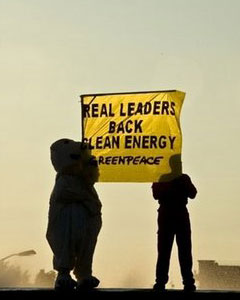
|  |  |  Americas & Beyond | August 2009 Americas & Beyond | August 2009  
Obama Attending First US-Canada-Mexico Summit
 Jennifer Loven - Associated Press Jennifer Loven - Associated Press
go to original
August 09, 2009


| | Greepeace activists stage a protest at La Minerva square in Guadalajara, Mexico. US President Barack Obama attends his first North American leaders summit in Mexico on Sunday with the economic crisis and swine flu on an agenda overshadowed by Mexican drug violence. (AFP/Ronaldo Schemidt) |  |
Washington – When President Barack Obama visited Mexico in April, the now-global swine flu epidemic — unbeknownst to the White House — had just begun there and an Obama aide returned home sick.

What could have become a diplomatic downer, however, ultimately turned into a bright spot.

Obama was never in danger, the aide and his family recovered, and the two nations cooperated extensively on the flu outbreak through the spring and beyond. The United States earned huge points with its southern neighbor for not joining the countries banning flights, halting trade and taking other actions that Mexico considered unfairly punitive.

Now, as Obama returns to Mexico, the swine flu that spread from there across the world is increasingly back in the news — and at the top of the agenda of at a lightning-quick, three-way summit Sunday and Monday.

Obama, Mexican President Felipe Calderon and Canadian Prime Minister Stephen Harder will try to build on that earlier cooperation to handle an expected new wave of cases during North America's upcoming flu season.

John Brennan, Obama's chief homeland security aide, said the talks are timely — and crucial, given the long borders the U.S. shares with Mexico and Canada. As important as it is to further link up health officials and ready vaccine and antiviral supplies, the three leaders also must together and publicly reinforce a determination not to panic when cases arise, he said.

"There are people who are going to be getting sick in the fall and die," Brennan said. Keeping the severity and reach of the illnesses to a minimum is a priority, but officials also "want to make sure that we do everything possible to ensure the continuation of commerce, transportation and trade between the three countries."

America's first- and third-largest trade relationships are with Canada and Mexico. All three are partners in the North American Free Trade Agreement, the largest free-trade zone in the world. Closing borders or restricting travel would be very costly for families and businesses on all sides of the borders, an important consideration given the limping economy and the fact that health experts see such actions as pointless in containing the flu's spread.

President George W. Bush kicked off the trilateral tradition in 2005 with the first summit held near his Texas ranch.

They typically are rather sleepy affairs — no splashy news, little attention. Despite the lofty name of North American Leaders Summit, it lacks a defining cause and is usually more a progress report on commercial and security integration than an action-packed headline-grabber.

Officials say the meetings are vital nonetheless.

Peter DeShazo, a former State Department official for Western Hemisphere affairs, said Canada and Mexico are vital to the U.S. economy and security, making regular conversations at the highest levels a must. "These relationships are so complex and multifaceted," said DeShazo, who directs the Americas Program for the Center for Strategic and International Studies.

Said Obama national security adviser James Jones: "I think you get in trouble when you wait too long before talking to your neighbors."

The fifth North American summit is short — just one evening and barely half the next day, but the list of issues is long.

The U.S. neighbors will want Obama to explain where America's economic recovery is going because both countries saw their own fortunes fall as a result of problems in the U.S. Obama will hear complaints from Calderon and Harper about "Buy American" requirements in the $787 billion economic stimulus package.

Climate change is a priority, too.

The three leaders also are expected to take a joint stand on a recent problem in their hemisphere — the June coup in Honduras that saw President Manuel Zelaya ousted by the military.

Obama planned a meeting late Sunday afternoon with Calderon. He did not schedule a separate session with Harper while in Mexico; the Canadian leader will see the president on Sept. 16 in Washington.

The three leaders were to have dinner together Sunday night, with the agenda intentionally open and free-flowing. The next day, they have more formalized meetings. They appear together before reporters ahead of their midday departures.

Obama's meeting with Calderon will continue his drive for a new tone in U.S.-Mexico relations.

They had their ups and downs under Bush, driven by a divide over the Iraq war, the United States' building of a border fence and Bush's failure to produce an immigration overhaul.

Like Bush, Obama has emphasized tighter border security. But he also has pledged to renew immigration overhaul efforts, including a citizenship path for illegal immigrants.

During his April visit, Obama made a welcome acknowledgment to Mexicans that Americans share the blame for violence south of border because of drug consumption and gun trafficking. Since then, the U.S. has made a bigger effort to halt the southward flow of guns and money.

Drug violence has killed more than 11,000 people since Mexico launched a national crackdown in 2006. But a $100 million installment of U.S. drug-fighting aid to Mexico is being held up over concerns in Congress over abuses by the military. |

 |
|  |



